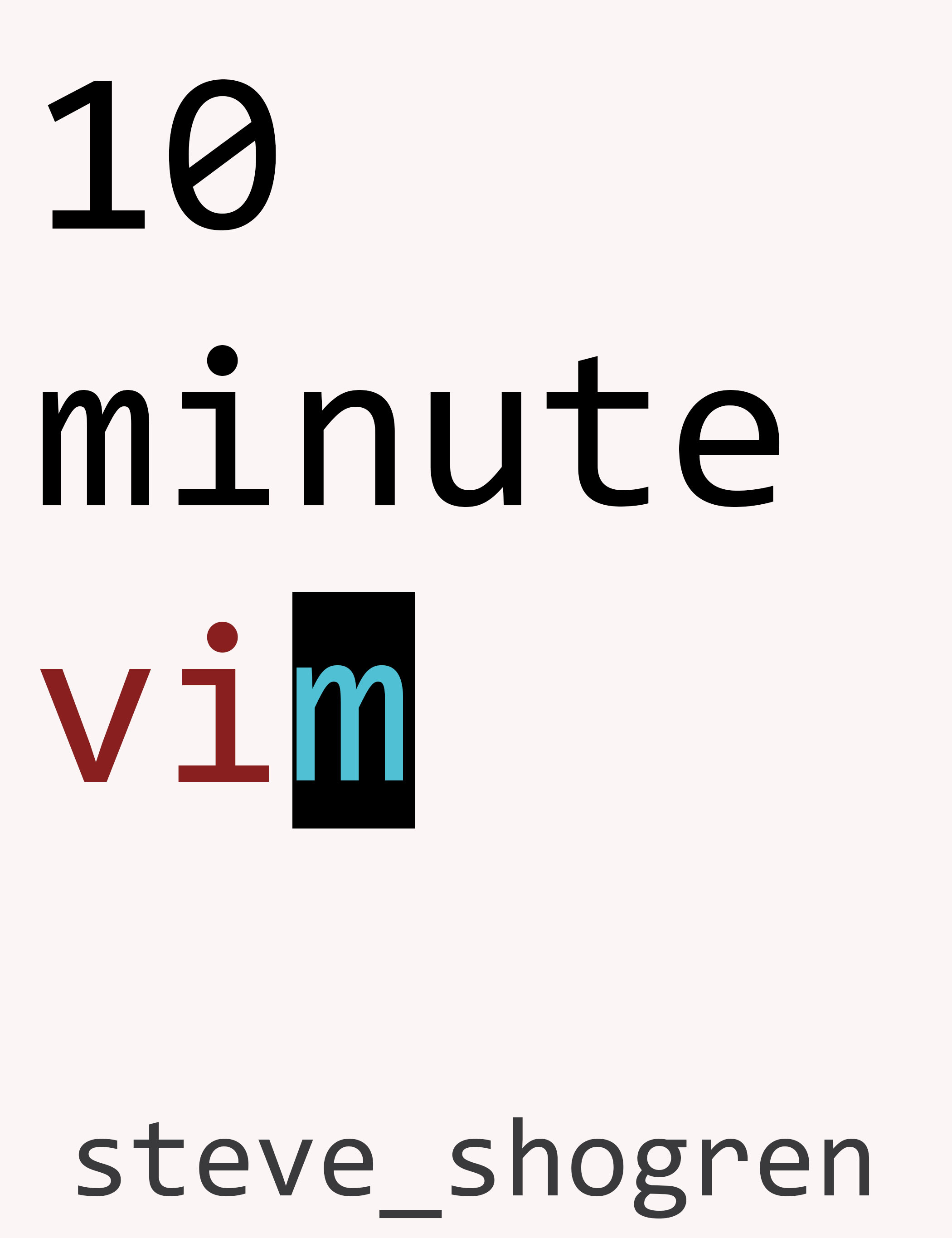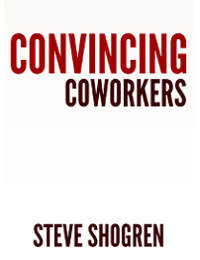(Want to become a Vim expert? Check out my new book: 10 Minute Vim)
> Learning Vim is a waste of time; I can prove it! - Anonymous
I recently had a gentle discussion with a new teammate about whether or not they should learn to use Vim. My team uses a Vim emulator inside Visual Studio and Emacs, and so we recommended he learn at least the basics so to reduce friction when pair-programming (which we do almost all the time).
He really had no desire to learn it, and took no small amount of offense when we suggested it. The friction he felt trying to “start over” really bothered him. He set out to prove that Vim was not worth his time, and that it was actually us who needed to stop using it, because we were the duped slow ones.
As any such localized experiments go, he never really came up with anything conclusive either way. Personally, I suspect he spent more time trying to figure out why Vim was worse than if he had just buckled down and learned it. This got me thinking about skills we learn as developers, and how much they cost.
Skills
Most skills fall along a continuum of tactical to strategic.
Tactical Skills
- Typing speed/accuracy
- Keyboard shortcuts
- “Mouse-free” editing systems: Vim, Emacs
- Clean coding practices
- Refactoring tools
- Repl Driven Development / Test Driven Development
- Debugging
Mid-way Skills
- Unit testing
- Building abstractions
- Designing simple solutions
- Automating tasks
- Learning new languages and frameworks
Strategic Skills
- Gathering requirements
- Training developers
- Organizing and leading teams
- “Understanding the real problem”
The more strategic the skills, the “softer” they become. The reason for this is that soft skills often allow for the greatest leverage on a project.
Why is this?
Consider the developer, who by more accurately gathering requirements for a few extra days, realizes that the stakeholder can use a preexisting solution instead of a six month planned project. If you consider how many keystrokes he saved, there is no way he could have typed fast enough to make up six months of effort. Unless he can type out a six month project in a few days, his time was better spent where it was. Obviously, these opportunities do not happen all the time, but they do happen and it doesn’t take more than one or two a year to have major impact!
Think about the return on investment for training developers. If you have an average team (and yes, we all do), there is a good chance you have some lower performing developers. I have witnessed many times where a few months of pairing to brush up the skills of a less skilled developer allowed them to become much more productive. In terms of total company effort, that small investment paid back many times before the end of the year as the newly trained developer was able to tackle their work with the renewed vigor that comes from a greater mastery of their work.
Similarly, the judicious use of automation for deployment, testing, and building greatly reduces the friction of development for entire teams. Lowered friction means less cognitive burden.
That being said, I think there comes a point where you have to put fingers to keyboard and actually produce working software. Of course, the fastest and best software is the software you never have to write. But, when you absolutely must write or modify software, the ability to execute is essential. Tactical skills increase in significance the closer you get to the work.
While a great software tactician will never “beat” a great strategist in terms of raw business value, a great strategist that is a terrible tactician can only talk their way out of work. A strategist who forgets or ignores good tactics is what we call an “architecture astronaut” or an “ivory tower architect”. These disconnected strategists eventually start to remove business value as their solutions make less and less practical sense.
I think a developer who wants to improve should make sure they are improving all across the spectrum. Don’t focus only on strategic or tactical skills, but seek projects and teams that will allow you to gain skills across the board. I like to try to focus on one skill from each side of the continuum each year. This year, it is emacs automation and monads on the tactical side, and leading mature teams on the strategic. By alternating readings, I find fuel to apply the strategies using these new tactics!
Lastly, on the subject of “what to study”, I think it is possible to study a number of subjects all across the continuum. Unless you have weeks where you never type any code at all, you can practice and learn new tactical techniques all the time. If it slows you down today, but speeds you up next week, it might just be worth it. Even if it slowed you down to a quarter your usual speed for two weeks, but then gives you a measly 5% boost to productively after that, you’ll earn that time back by the end of the year, plus some. And 5% is not hard to do. I’d guess learning a few new navigation or refactoring shortcuts would net you 5% easily.
When studying more strategic skills, the same holds, but they are harder to learn. The best way I have found for learning strategic skills is to read books about it, and try to work around others who are good at it. Neither books or working with others will get you all the way there, you also have to apply it yourself.
Progression
I usually recommend that the more experienced a person is, the more mastery they should have in the tactical skills. A suggested path I’ve recommended for a new developer would look like this:
0 - 6 Months:
- Typing speed/accuracy
- Keyboard shortcuts
- Repl Driven Development / Test Driven Development
- Unit testing
- Clean coding practices
- Designing simple solutions
0 - 2 Years:
- Debugging
- Refactoring tools
- Building abstractions
- Automating tasks
- Learning new languages and frameworks
- “Mouse-free” editing systems: Vim, Emacs
0 - 50+ Years:
- Gathering requirements
- Training developers
- Organizing and leading teams
- Understanding the real problem
This is not a hard and fast list. If you are completely unsure of what to learn, I recommend this rough progression just to get you started. If you are a two year developer, and you cannot touch type, I think learning it can really help, alongside the other 0 - 2 year skills.
Not all skills along the list build on a mastery of the ones below it. A developer can absolutely get to a very senior mastery of the strategic skills only knowing one language and using notepad.exe. I believe that they are missing out on a deep richness that comes from better knowing their field, and I suggest they spend some time learning new languages and tools. The more tactical the skill, usually, the easier it is to learn, so it won’t take very much time to come up to speed.
The hardest thing I think a more senior developer has to deal with is humbling themselves to learn a perceived “entry-level” skill. I have another post brewing about this very topic, so I’ll not get too much into it here. But if you have gotten to a place where you feel like you are so senior that some skills are too “entry-level” for you to learn, I think you need to humble yourself and learn them. Nothing can be gained from pretending like they are not valuable. Additionally, the assumption that your time is now so valuable that it is “a waste” to spend it on learning tactical skills is absurd.
Claiming you are too good to waste on low level skills not only belittles everyone around you, but belies a deep misunderstanding of our field. The senior developer who takes five times as long to enter and edit code isn’t just spending longer to do that task, but they are paying a missed opportunity cost in time they could have spent in more strategic endeavors. They could have been training, planning, gathering requirements, building better automation, etc, instead they stubbornly claim “typing isn’t what software is about”. By giving it so little credence, they have made it most of their actual mental effort! Take simple touch-typing. Imagine how much mental effort it takes the hunt-and-peck typist to write out a single line of code. That is mental overhead that is simply wasted. The developer who doesn’t have to think about how to move a file or edit a structure finds themselves quickly through the tactical efforts with little distraction, free to think deeply.
Resources
Here are some links and books to get you started on these topics.
- Typing speed/accuracy - Typing of the Dead
- “Mouse-free” editing systems: Vim, Emacs - Vim Adventures
- Clean coding practices - Clean Coders
- Repl Driven Development - RDD
- Test Driven Development - http://www.amazon.com/Test-Driven-Development-By-Example/dp/0321146530
- Debugging - Debugging
- Building abstractions / Designing Simple Solutions - Structure and Interpretation of Computer Programs
- Training developers - Pair Programming
- Organizing and leading teams - Managing Humans
- Understanding the real problem - Thinking Fast and Slow
- Learning new languages and frameworks - Teach Yourself Programming in Ten Years
- Automating tasks Rake to Automate Tasks
(Want to become a Vim expert? Check out my new book: 10 Minute Vim)

